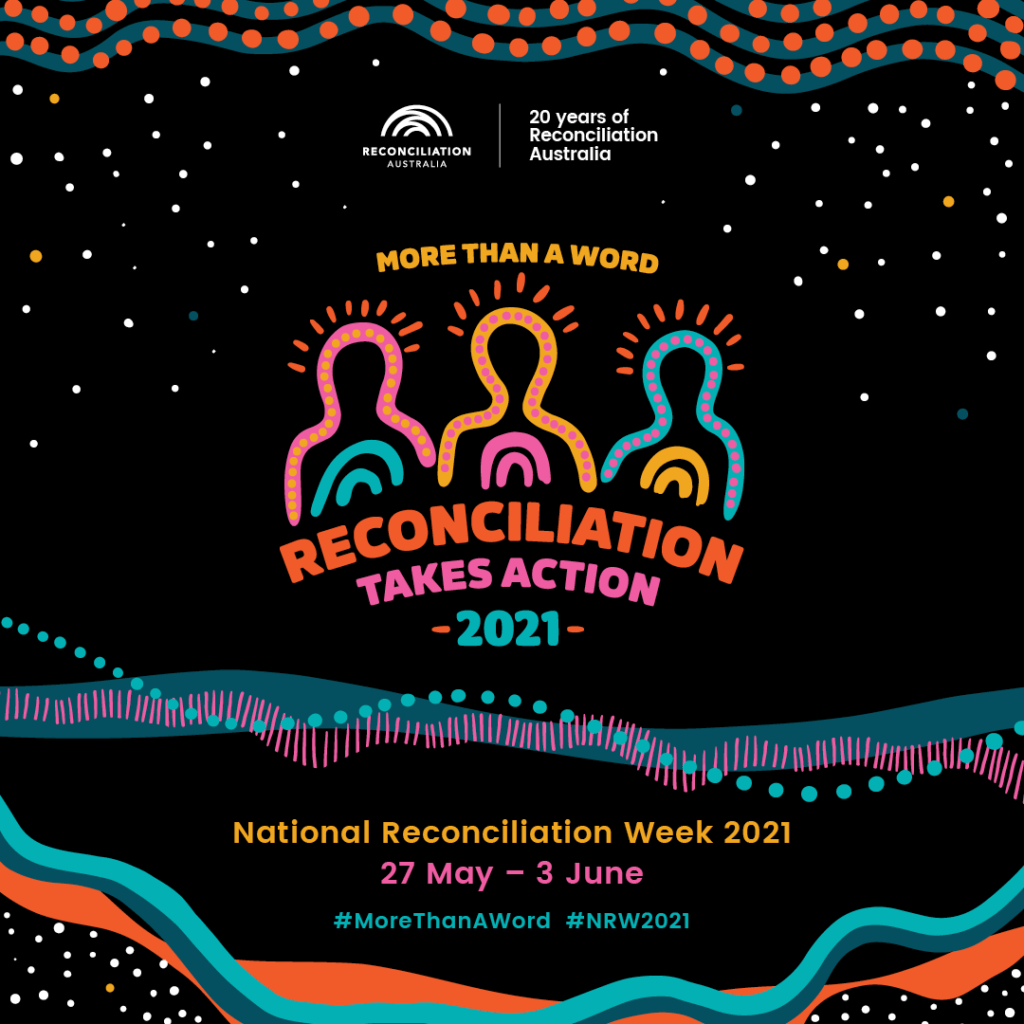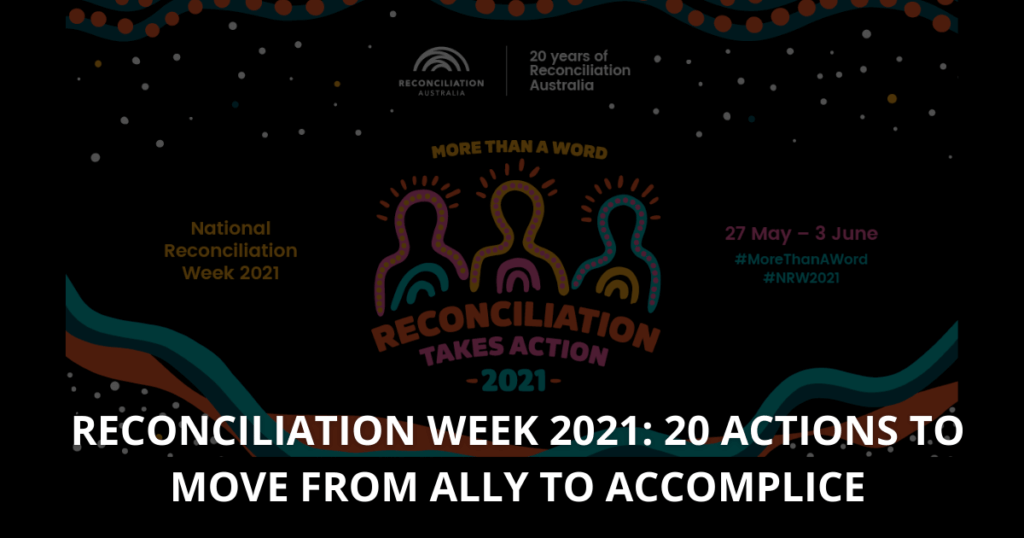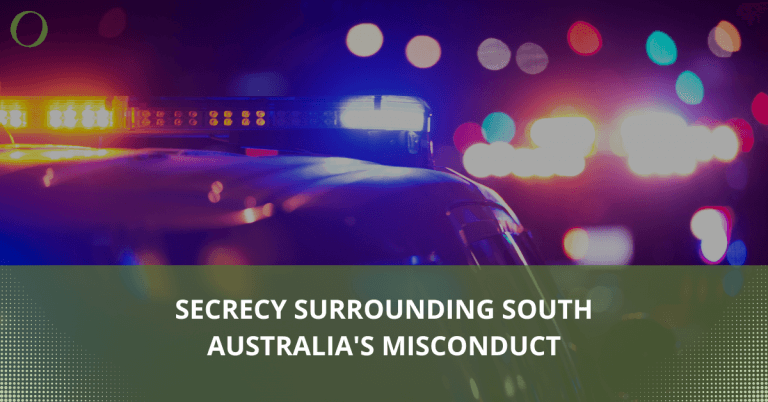
More than a word. Reconciliation takes action.
This is the theme for the 2021 Reconciliation Week, which urges movement towards braver and more impactful action.
“Reconciliation is a journey for all Australians – as individuals, families, communities, organisations and importantly as a nation,” Reconciliation Australia states on their website.
“At the heart of this journey are relationships between the broader Australian community and Aboriginal and Torres Strait Islander peoples.”
20 Actions for Reconciliation
This Reconciliation week, we move from safe to brave on issues affecting Aboriginal and Torres Strait Islander peoples. Here are 20 ways to push for #morethanaword, according to Reconciliation Australia.
- Move from Ally to Accomplice – Know how to be a better ally and further, be an accomplice. Disruption of the status quo is needed to affect real change and since First Nations people only make up 3 per cent of the population, allies and accomplices are needed in full support.
- Call out racism – Check how you understand your unconscious bias and attitudes. Call out racism. Have conversations with family and friends.
- It’s all our history – When talking about the history or story of Australia, always include the participation and presence of Aboriginal and Torres Strait Islander peoples. Find out facts and ways to learn and talk about Australia’s history
- Know your local history – Australia’s history is marred by massacres, forced removals and cultural genocide of Aboriginal and Torres Strait Islander peoples. Memorialising and commemorating those who committed these acts continues the suffering inflicted by the original crime. Investigate your local history and the record of colonial leaders who are memorialised by place names in your local area. If they are guilty of historical crimes against First Nations peoples, then start a community conversation about renaming these places
- Create culturally safe places -Understand what could make your school or workplace a more welcoming and safe place for Aboriginal and Torres Strait Islander peoples.
- Make reconciliation everyone’s business – Start a Reconciliation Action Plan (RAP) for your workplace.
- Drive reconciliation in education – See all the ways you can help your school or early learning service learn about teaching and learning about reconciliation on the Narragunnawali website and at Learn our Truth.
- Aim higher in higher education – Encourage your educational institution to fund research into frontier wars, massacres, and other areas of underexplored Australian history. Take the workload off First Nations academics.
- Support self-determination – Understand the strengths in First Nations community control in governing, health, education curricula, and media representation.
- Get your facts first hand -Inform yourself with First Nations produced and created content and news. Check out and follow NITV, Koori Mail, National Indigenous Times, IndigenousX, ABC Indigenous and find your local broadcaster via First Nations Media. Speak out against and prosecute blatant racism and misinformation in mainstream media reporting.
- Act to protect First Nations cultues -Host a Reconciliation Film Club screening in your home, workplace, or school. Support listen to and distribute music from Indigenous artists on IndigiTUBE and Spotify playlists like NIMA , Original Storytellers,
- Support economic development – Understand the historical causes of poverty and economic disempowerment through stolen wages dispossession, discrimination and exclusion. Find out ways you can support Aboriginal and Torres Strait Islander economic development and businesses via Supply Nation when searching for contractors, suppliers and products.
- Understand political representation – Learn the long history of representative bodies and calls for treaty. Support current calls by First Peoples such as treaties, constitutional reform, and the Uluru Statement from the Heart.
- Challenge our leaders and take action on justice -Proportionally, Aboriginal and Torres Strait Islander peoples are the most incarcerated people on the planet. There have been more than 470 who have died in police and prison custody since 1991. Stand with First Peoples to lower incarceration rates, rates of family violence, and children in out of home care. Support and share the Change the Record and Raise the Age campaigns.
- Buy from First Nations businesses –Learn about the damage caused by casual or deliberate cultural appropriation. Follow and support businesses like @TradingBlak.
- Defence land rights and native title – Educate yourself about the details and history of First Nations Land Rights and Native Title in Australia. Find out about Land Justice efforts and advocacy in your local area. Appropriately leverage your skills and sphere of influence in support.
- Acknowledge country – Know whose Country you are on. Resources like the AIATSIS Map of Indigenous Australia are a useful starting point, but go further. Know the difference between and Ackowledgement of Country and a Welcome to Country. Including the name of Country when posting letters and parcels. Encourage businesses you buy from to add an address section for this on ordering forms.
- Care for country – Support Aboriginal and Torres Strait Islander perspectives systems of knowledge on our natural environment, including Seed Mob, the Aboriginal Carbon Foundation, Firesticks Alliance, and Yerrabingin. Learn about how climate change is going to directly affect Aboriginal and Torres Strait Islander peoples. Stand up in support for those it’s already affecting.
- Speak up for languages -Know your local area language(s) of the Traditional Custodians of the land on which you live. Where available, organise for a Traditional Custodian to teach some of this language to your workplace or community group.
- Get involved beyond NRW2021 – Take these actions and reflect on how you are going to move from safe to brave on issues affecting Aboriginal and Torres Strait Islander peoples, beyond NRW2021. Share with your community, family and friends. Ask others to take their awareness, and turn it into action on reconciliation.

Sarah Gore
Sarah is a civil solicitor who primarily practices in defamation, intentional torts against police, privacy and harassment.





